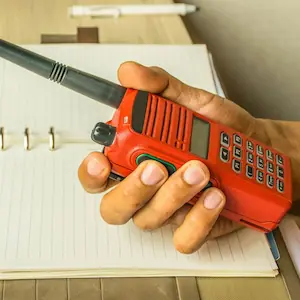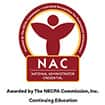Emergency Preparedness in Child Care
Training to help you plan for emergency situations.

Course Overview
This course provides information and resources for center and home-based childcare settings to effectively plan for emergency situations including medical crises, natural disasters, and threats of violence.
Topics include risk assessment, documenting an emergency preparedness plan, preparing first aid and emergency supply kits, communicating with families, and meeting children’s needs during emergencies.
Choose a course format (online or coursebook) to get started:Course formats
This course is offered in both our coursebook (with required online component/testing) and our fully online format. The online format of this course includes audio narration in most course sections. Click here to learn more about Care Courses' training formats.
Acceptance information
This course is accepted for annual state training requirements in most states (including Vermont's emergency preparedness training requirement) and for the CDA and for CDA renewal training requirements.
Information on specific states:
- Maryland: This course does not meet Maryland's emergency preparedness training requirement.
- Nevada: This course is not approved for annual clock hours or to meet the Nevada requirement for training in emergency preparedness.
- North Carolina: This course does not meet North Carolina's emergency preparedness and response in child care training requirement.
- Vermont: This course does satisfy the emergency preparedness training requirement.
- Washington State: This course is not accepted for Washington Merit or Washington Stars clock hours.

NAC training
The NECPA Commission, Inc. has approved this educational program as meeting the criteria for continuing education for the National Administrator Credential. Click here for more approved NAC training.
Learning outcomes
After completing this course you will be able to:
- explain why it is important to plan for and practice what to do in case of an emergency in your early childhood program
- describe components of an appropriate emergency preparation and response plan
- list items you should include in emergency supply kits
- identify appropriate safety measures to take during an emergency
Topics covered
- Types of different emergency situations
- Examples of mitigation procedures to lessen the impact of disasters
- The importance of having documentation of emergency plans
- Subjects and areas to address in a documented emergency preparedness plan
- Emergency contact information to maintain and post
- Methods of communication to use during emergencies
- Technology and apps to inform people of potential hazards
- The need for CPR and first aid training and certification
- Recommended items for first aid and emergency supply kits
- When and how to use a fire extinguisher
- Assessing children’s injuries or illness when deciding to call for emergency help
- Responding to an outbreak of infectious disease
- Responding to a missing or abducted child
- Planning procedures for evacuations and relocations
- Tips for getting out safely from a burning building
- Recommended shelter-in-place and lockdown procedures
- Addressing the needs of very young children and children with special needs
- The importance of holding drills and practicing emergency response procedures
- Communicating emergencies to families, staff, and children safely and calmly
What our students say about Emergency Preparedness in Child Care
How Care Courses® Training Works: Details & Support
Click to view:
Course Details & Support
Prerequisites
- Language: Fluent reading and writing in the language of instruction (English or Spanish).
- Technology: Internet access and a web-enabled device (computer, smartphone, or tablet).
Access & Completion Deadline
- This training expires 12 months from the date of purchase.
- To receive a certificate of completion, you must successfully finish the course before the expiration date.
Learning Methods
- Read instructor-written material
- Watch videos
- Listen to audio segments
Assessments
- Multiple-choice quizzes
- Written assignments
Requirements for CEUs and Clock Hours
To earn CEUs and Clock Hours for a course, you must:
- Agree to and acknowledge our Honor Code & Policy
- Follow all instructions for written assignments
- Demonstrate comprehension of the course content
- Achieve the passing score specified in your course.
Quizzes and Assessments
- If your score falls below the passing mark, a trainer will review your work. If needed, you may be asked to speak with a trainer.
- You will have a second chance to retake any quiz or assessment.
- If you do not pass on your second attempt, contact us at info@carecourses.com. We will review your course and follow up directly.
- All quizzes are open book; all answers are found in the course material.
Certificates
- Official Care Courses certificates of completion record your clock hours and CEUs.
- Certificates are available in the My Courses area of your account.
- Please note: All course and certificate dates and times are on Eastern Time.
Getting Started
- See how our training works on the training process page.
- Watch our course navigation video for a quick tour of the online portal.
- Free Unlimited Assistance
- We’re here to help with training, billing, and technical support questions.
- Phone: 1-800-685-7610 (Mon–Fri, 9:00 a.m.–5:00 p.m. Eastern)
- Email: info@CareCourses.com or techsupport@CareCourses.com (days, evenings, and weekends)
About Care Courses
- Care Courses offers over 50 professional development courses and one non-credit training tutorial on the CDA process.
- All professional development courses include clock hours, CEUs, and an official online certificate of completion.
- (The free CDA tutorial does not offer clock hours or a certificate.)
Tuition & Bundles
- Course tuition entitles one person to receive the clock hours and CEUs granted upon successful completion.
- Bundle pricing covers tuition for all courses included in the bundle.

